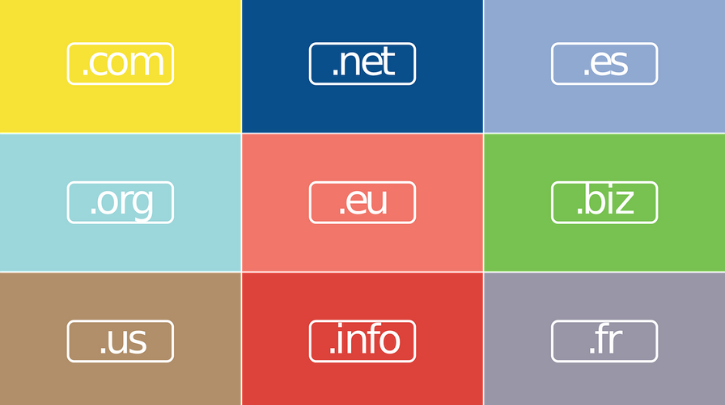One of the first things you need to think about when starting an online presence is your domain name. In addition to serving as a website address, your domain name is a crucial component of any SEO plan. It is essential to the internet success, branding, and visibility of your website. We will go into the world of domain names and investigate SEO recommended practices in this blog post. To assist you in selecting the ideal domain name for your website, we will also offer a list of the best domain name suppliers.
What is a domain name?
The specific address that visitors enter into their web browsers to access your website is called a domain name. The actual domain name and the domain extension make up its two main components, on average. Consider the domain name “www.example.com,” where “example” is the domain name and “.com” is the domain extension. Websites on the internet are identified and located using domain names.
What are the types of Domain Names:
There are several types of domain names that you can choose from, depending on your website’s purpose and target audience. Let’s take a closer look at each type:
- Generic Top-Level Domains (gTLDs): These are the most common types of domain extensions, such as “.com,” “.org,” “.net,” and “.info.” They are generic and can be used for any type of website.
- Country Code Top-Level Domains (ccTLDs): These domain extensions are specific to a particular country or geographic region, such as “.us” for the United States, “.ca” for Canada, and “.uk” for the United Kingdom. If you have a website targeting a specific country, using a ccTLD can help with local SEO.
- Brand TLDs: These are domain extensions that represent a brand or company, such as “.apple,” “.google,” and “.bmw.” Brand TLDs can be used for branding purposes, but they are not as commonly used as gTLDs or ccTLDs.
- New gTLDs: These are newer domain extensions that were introduced in recent years, such as “.blog,” “.shop,” and “.tech.” New gTLDs offer more options for creative and unique domain names, but they may not have the same level of recognition and trust as traditional gTLDs.
SEO Best Practices for Domain Names:
Choosing the right domain name is crucial for your SEO strategy. Here are some best practices to keep in mind when selecting a domain name for your website:
- Keep it Short and Memorable: Short and catchy domain names are easier for users to remember and type into their browsers. Avoid long and complex domain names that are difficult to spell or pronounce. A short and memorable domain name can also help with branding and recognition.
- Use Keywords: Including relevant keywords in your domain name can help with SEO. For example, if your website is about digital marketing, including the keyword “digital marketing” in your domain name can help search engines understand the content of your website. However, be careful not to stuff too many keywords into your domain name, as it may look spammy and negatively impact your SEO.
- Avoid Numbers and Hyphens: Numbers and hyphens can make your domain name confusing and harder to remember. They can also be misinterpreted by search engines, leading to potential SEO issues. It’s best to stick to letters when choosing your domain name.
- Use a Brandable Name: If you are building a brand, using a brandable name for your domain can help with brand recognition and recall. Brandable names are unique, memorable, and distinct, making them stand out in the crowded online space
How To Buy A Domain Name:
When it comes to buying a domain name, it’s important to follow a step-by-step process that is both search engine and user-friendly. Here’s a breakdown of the steps involved:
- Research and Brainstorm:
- Identify the purpose of your website and the target audience.
- Brainstorm and come up with a unique and memorable domain name that reflects your brand or website’s identity.
- Check Availability:
- Use a domain registrar or provider to check the availability of your chosen domain name.
- Make sure it is not already registered by someone else.
- Consider alternative extensions if your desired domain name is not available with the popular .com extension.
- Choose a Reliable Registrar:
- Select a reputable domain registrar that offers competitive pricing, good customer support, and reliable services.
- Consider factors like ease of use, domain management features, and additional services offered.
- Register Your Domain:
- Provide the necessary information, such as your name, contact details, and payment information, to register your chosen domain name.
- Decide the registration duration, whether it’s for a year or longer.
- Review and confirm the purchase, ensuring all the details are accurate while registering a domain name.
- Consider Additional Services:
- Explore additional services offered by the registrar, such as domain privacy protection, email hosting, or website builders.
- Evaluate their value and decide if you need any of these services for your website.
- Complete the Payment Process:
- Proceed to the payment section and choose a secure payment method.
- Verify the transaction details and ensure the payment process is encrypted for security.
- Verify Ownership:
- After the purchase, you will receive a confirmation email with instructions to verify your ownership of the domain.
- Follow the provided steps to complete the verification process.
By following these steps, you can successfully purchase a domain name in a search engine and user-friendly manner. Remember to choose a domain name that aligns with your brand, research reputable registrars, and consider additional services that may enhance your website’s functionality.
Some of the Domain name provider Companies :
- GoDaddy: GoDaddy is one of the largest and most popular domain name providers globally, offering a wide range of domain extensions at competitive prices. They also provide additional services like website hosting, website builders, and email services.
- Namecheap: Namecheap is known for its affordable domain registration services and user-friendly platform. They offer a wide variety of domain extensions, SSL certificates, and website hosting options.
- Domain.com: Domain.com is a popular domain name provider that offers a wide range of domain extensions, website hosting, email services, and website design tools. They also have a domain name search tool to help users find the perfect domain name for their business.
- Bluehost: Bluehost is a well-known web hosting provider that also offers domain registration services. They offer a free domain name for the first year with their hosting plans, making it a convenient option for those looking for an all-in-one solution.
- Google Domains: Google Domains is a domain registration service offered by Google, providing a simple and straightforward platform for domain registration. They offer a wide range of domain extensions and also provide additional features like email forwarding and domain management tools.
- BigRock: BigRock is one of the leading domain name providers in India, offering a wide range of domain extensions, website hosting, and email services. They are known for their competitive pricing and reliable services.
- Hostinger India: Hostinger India is a web hosting and domain registration provider that offers affordable domain registration services along with website hosting plans and website design tools. They are known for their budget-friendly pricing and reliable hosting services.
- ResellerClub: ResellerClub is a popular domain name provider in India that offers a wide range of domain extensions, along with website hosting, email services, and website design tools. They are known for their competitive pricing and comprehensive domain management features.



